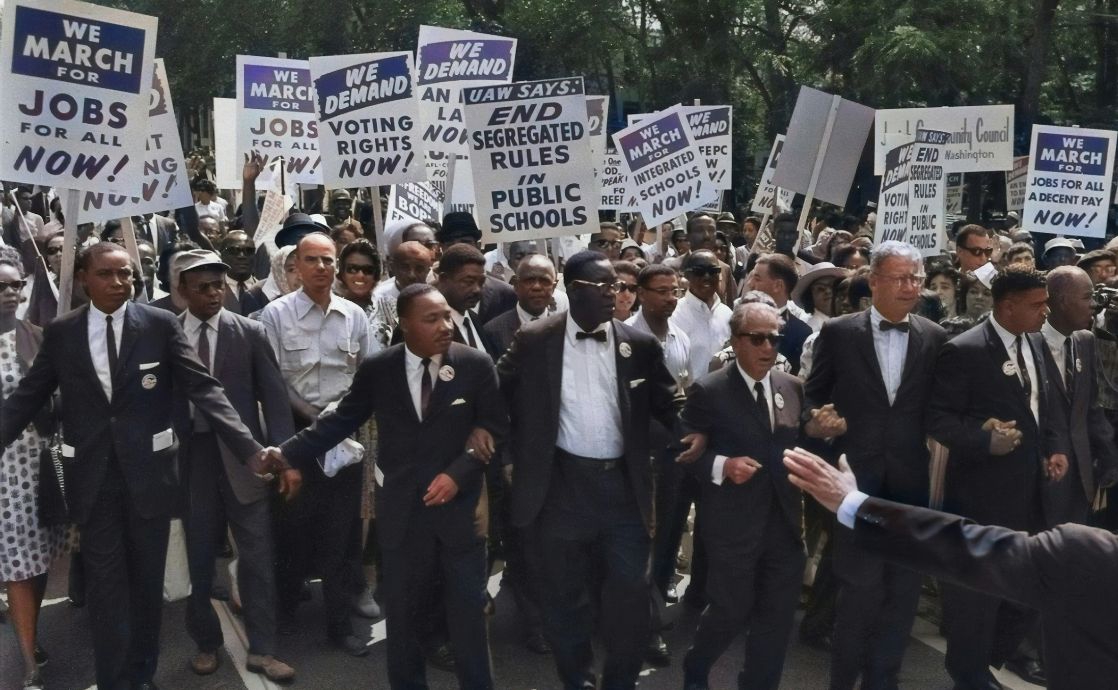The views expressed in our content reflect individual perspectives and do not represent the authoritative views of the Baha'i Faith.
I was always taught about Dr. Martin Luther King Jr.’s efforts to convince white people to stop hating and oppressing Black people during a very segregated time in our nation’s history.
I was, of course, taught about the Dr. King who advocated for interracial unity and preached nonviolence, even as Black people were called the N-word, spat on, pelted with food, tear-gassed, attacked by vicious dogs, and sometimes hunted down — enduring relentless taunts, threats, terrorism, and assaults from white people, along with the constant humiliation they faced in the pursuit of change.
However, I never knew about Dr. King’s efforts to restore dignity, esteem, and self-worth among people of African descent, encouraging us to defy the degradation and demonization we have faced.
Nurturing, encouraging, and safeguarding marginalized communities is one of the inescapable obligations of the Baha’i community. Moreover, as former member of the Universal House of Justice Glenford E. Mitchell wrote in 1967, “Baha’u’llah [the prophet and founder of the Baha’i Faith, born in 1817] came to restore dignity and identity to downtrodden peoples.”
So, when I read Dr. King’s empowering words to our historically oppressed demographic in the last year of his life, I was happy to learn that he was also working towards this mission.
As Dr. King wrote in his 1968 book, “Where Do We Go From Here: Chaos or Community?,” “The Negro must be grasped by a new realization of his dignity and worth. He must stand up amid a system that still oppresses him and develop an unassailable and majestic sense of his own value. He must no longer be ashamed of being black.”
RELATED: How Do We Heal From Internalized Racism?
How Language Was Used to Strip Dignity

Dr. King continued, “The job of arousing manhood within a people that have been taught for so many centuries that they are nobody is not easy. Even semantics have conspired to make that which is black seem ugly and degrading.”
Understanding the power that language has to enforce stereotypes and strip people of color of their dignity, the Universal House of Justice wrote in a 2022 letter to the Baha’is in the Democratic Republic of the Congo:
Language is flippantly used to entrench negative stereotypes that stigmatize and malign others.
For example, when race was socially constructed and people were classified into Black and white groups, language was used to demonize anyone and anything associated with Blackness.
Dr. Martin Luther King Jr. further explained:
In Roget’s Thesaurus there are some 120 synonyms for ‘blackness’ and at least 60 of them are offensive—such words as ‘blot,’ ‘soot,’ ‘grime,’ ‘devil’ and ‘foul.’ There are some 134 synonyms for ‘whiteness,’ and all are favorable, expressed in such words as ‘purity,’ ‘cleanliness,’ ‘chastity’ and ‘innocence.’ A white lie is better than a black lie. The most degenerate member of a family is the ‘black sheep,’ not the ‘white sheep.’
Ossie Davis has suggested that maybe the English language should be ‘reconstructed’ so that teachers will not be forced to teach the Negro child 60 ways to despise himself and thereby perpetuate his false sense of inferiority and the white child 134 ways to adore himself and thereby perpetuate his false sense of superiority. The history books, which have almost completely ignored the contribution of the Negro in American history, have only served to intensify the Negroes’ sense of worthlessness and to augment the anachronistic doctrine of white supremacy.
RELATED: 9 African American Inventors Who Changed the World
How MLK and the Baha’i Writings Sought to Restore Dignity to Black People
![Civil Rights March on Washington, D.C. [Leaders of the march leading marchers down the street.]" Original black and white negative taken August 28th, 1963,](https://media.bahaiteachings.org/2024/08/29124327/how-mlk-restore-dignity-to-black-people.jpg)
Dr. King believed that the most powerful weapon we can wield to offset this “cultural homicide” is psychological freedom, which we can obtain through “a firm sense of self-esteem.”
He wrote, “With a spirit straining toward true self-esteem, the Negro must boldly throw off the manacles of self-abnegation and say to himself and the world: ‘I am somebody. I am a person. I am a man with dignity and honor. I have a rich and noble history, however painful and exploited that history has been. I am black and comely.’”
The Baha’i writings also restore this dignity and honor to people of African descent. Not only do they celebrate our persistent strength and resilience through generational suffering, but they also highlight our spiritual destiny.
In the 1950s, Shoghi Effendi, the Guardian of the Baha’i Faith, instructed Dr. Mehdi Samandari, a Baha’i who had traveled to Africa, to share a quote from the Qur’an with every African he encountered. Shoghi Effendi told Dr. Mehdi Samandari to tell them that this verse referred specifically to them:
And We desire to show favor to those who were brought low in the land, and to make them spiritual leaders among men, and to make of them Our heirs.
Furthermore, Baha’u’llah compared people of African descent “to the black pupil of the eye surrounded by the white. In this black pupil you see the reflection of that which is before it, and through it the light of the Spirit shines forth.”
In addition to expressing the need for the abolition of prejudice and stating that racism is the “most vital and challenging issue” confronting the United States, the Baha’i writings offer solutions and practical steps to achieve racial unity and healing, empowering people of every background to play a part in transforming our society.
RELATED: How We Can Create Positive Race Relations in the US
As Dr. King wrote:
We Negroes, who have dreamed for so long of freedom, are still confined in a prison of segregation and discrimination. Must we respond with bitterness and cynicism? Certainly not, for this can lead to black anger so desperate that it ends in black suicide. Must we turn inward in self-pity? Of course not, for this can lead to a self-defeating black paranoia. Must we conclude that we cannot win? Certainly not, for this will lead to a black nihilism that seeks disruption for disruption’s sake.
Must we, by fatalistically concluding that segregation is a foreordained pattern of the universe, resign ourselves to oppression? Of course not, for passively to cooperate with an unjust system makes the oppressed as evil as the oppressors. …To guard ourselves from bitterness, we need the vision to see in this generation’s ordeals the opportunity to transfigure both ourselves and American society.
The Baha’i writings outline the path to both personal and societal transformation. I’m so grateful that the central figures of the Baha’i Faith gave us this vision of a just, diverse, and united destiny for humanity and the detailed blueprint to get there.
















Comments
Sign in or create an account
Continue with Googleor